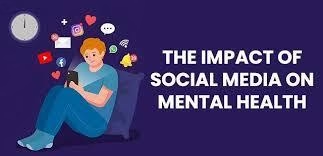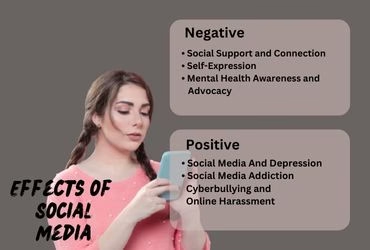
Increased Anxiety and Depression
One of the most widely discussed concerns about social media is its link to mental health issues, particularly anxiety and depression. Research has shown that heavy social media use, especially among teens and young adults, can contribute to feelings of inadequacy, loneliness, and stress. This is particularly true for platforms that emphasize image-based content, like Instagram, where users often compare themselves to others.
For instance, studies have shown that seeing curated, idealized images of others’ lives—whether it’s vacation photos, glamorous outfits, or seemingly perfect relationships can lead to “social comparison.” This constant comparison can make individuals feel like they aren’t measuring up, fueling feelings of low self-esteem and dissatisfaction with their own lives. Over time, these negative emotions can develop into anxiety or depressive symptoms.
Additionally, the very nature of social media—where likes, comments, and shares act as metrics of validation—can amplify feelings of insecurity. When users post content and don’t receive the expected level of engagement, it can lead to a sense of rejection or low self-worth.

Cyberbullying and Online Harassment
Another negative impact of social media is the prevalence of cyberbullying and online harassment. The anonymity provided by the internet makes it easier for people to engage in hurtful behaviors without facing direct consequences. Victims of cyberbullying may experience depression, anxiety, and even suicidal thoughts. In extreme cases, these online attacks can have life-altering effects.
Teenagers, in particular, are vulnerable to cyberbullying, as they often lack the coping mechanisms necessary to deal with online cruelty. The constant connectivity of social media means that bullying can extend beyond school hours, making it harder for victims to escape the harassment. Social media platforms have begun taking steps to address this issue, but the problem persists.
Sleep Disruptions
Excessive social media use can also have a direct impact on sleep, which is essential for maintaining good mental health. Studies have shown that individuals who use their phones or social media platforms late into the night are more likely to experience sleep disturbances, which in turn can exacerbate feelings of anxiety and depression. The blue light emitted by screens can interfere with the production of melatonin, the hormone that regulates sleep, making it harder for users to fall asleep and stay asleep.
Furthermore, the constant stream of information and emotional stimuli on social media can cause users’ minds to remain hyperactive, even when they try to wind down for the night. This “always-on” nature of social media can lead to sleep deprivation, which has been linked to an increased risk of mental health problems, including mood disorders, cognitive impairments, and difficulty concentrating.
The Positive Effects of Social Media on Mental Health
Despite these concerns, social media is not inherently harmful. It also offers significant mental health benefits, especially when used mindfully and purposefully.
Access to Mental Health Resources
Social media can also serve as a valuable tool for spreading awareness about mental health and providing resources to those in need. Platforms like Instagram, Twitter, and TikTok have seen the rise of mental health advocates and professionals who share coping strategies, self-care tips, and resources for seeking therapy. This can help to destigmatize mental health issues and encourage individuals to seek help when needed.
Inspiration and Motivation
Social media can also have a positive impact by providing users with inspiration and motivation. Fitness influencers, wellness advocates, and self-help gurus often use social media to share motivational content, healthy living tips, and success stories that encourage others to improve their mental and physical well-being.
For example, a person struggling with depression or low self-esteem might follow an account that promotes body positivity or self-compassion, which could help shift their mindset over time. Similarly, social media can introduce users to new hobbies, mindfulness techniques, or mental health apps that they might not have discovered otherwise.
Conclusion
The relationship between social media and mental health is complex. While it can certainly have negative effects, such as increasing feelings of anxiety, depression, and social comparison, it can also provide significant benefits, including connection, support, and inspiration. As with most things in life, the key is moderation and mindfulness. By being intentional about how we engage with social media, we can harness its positive aspects while minimizing its potential harm to our mental well-being.

